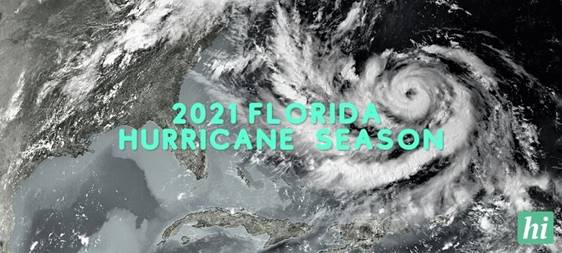It’s officially June, the unofficial start of Florida Summer. With half of the year gone at a rapid pace, we finally get something to look forward to, The 2021 Atlantic Hurricane Season! (The only thing we truly look forward to in regards to Hurricane Season is the end).
While we do not actually look forward to many heavy rain storms and possible hurricanes, it is in your best interest to know what hurricane season is all about and how it affects you as a Floridian. Whether you are new to the area or have been around the block a few times, we will go over some useful information about the upcoming season. Just a reminder that The official Atlantic hurricane season is between June 1 to November 30 every year! While this is the only thing that stays constant, it is always a whirlwind of uncertainty for us Floridians to keep track of every storm trying to come at us!
1. Named storms are coming!
According to The National Oceanic & Atmospheric Administration (NOAA), they predict that we can see a range of 13-20 named storms this 2021 season. While these are predictions, last year our stats were: 17 named storms, 11 hurricanes, and 4 major hurricanes. 2020 was rough, especially in the storm department.
Did you know that there are special distinctions for determining storms and their names? A tropical cyclone can become a tropical storm (39 mph – 73 mph) or a hurricane (74 mph or higher).
Fact: Florida has been hit by 121 hurricanes and 37 major hurricanes since 1851 — by far the most of any state.
2. Many storms change directions fast!
This may not surprise some, but to others it means staying or evacuating. Storms are often volatile and depending on the time or geographic location and they can change paths quickly. We have had some close calls in the Gulf Coast, especially with last year’s Tropical Storm Cristobal. While we tracked it coming towards us, overnight it switched directions and hit Louisiana. We were exhaling a sigh of relief when it turned and though we wish no harm to anyone or any other state, Louisiana did see some major damage. We hope all storms change head into the ocean where they fizzle out, as nobody wants to deal with them!
3. “Hurricane Insurance” can be part of your homeowners policy!
Some homeowners insurance policies will cover you in the event of hurricane damage. If you have a hurricane or wind deductible listed on your home insurance policy, then you are covered for named storms! Harris Insurance recommends that everyone opt for wind coverage when presented with the option. When living in Florida’s coastal areas, which are areas close to or on the water, you are usually at a higher risk of flooding. Flood insurance may be an additional cost but Florida homeowners should also carry additional insurance for flood insurance A combination of insurance policies geared towards wind and flood hurricane coverage is simply referred to as “hurricane insurance.”
4. Are You Prepared for Hurricane Season?
Always check your property in the event that a storm is coming your way. Also make sure to have evacuation points figured out and a checklist for your next plan of action! While our goal is not to scare you, we prefer to give you all the information before the season begins. As your friendly neighborhood Insurance Agency, we look out for our community’s safety and wellbeing!
Did you know we have a Harris Hurricane Handbook?
You can get your copy of the 2021 Harris Insurance Hurricane handbook now! Our FREE guide will help you through the season, and gives you a wealth of resources that will help you make the best decisions to keep you, your family, and your property safe. It will come in handy!
Stay safe this Hurricane Season. As always, please let our licensed Agents know how we can assist you with your Florida insurance needs. Call us at 850.244.2111, email at service@harrisinsurance.com, or request your quote here.
LEGAL DISCLAIMER
Views expressed here do not constitute legal advice. The information contained herein is for general guidance of matter only and not for the purpose of providing legal advice. Discussion of insurance policy language is descriptive only. Every policy has different policy language. Coverage afforded under any insurance policy issued is subject to individual policy terms and conditions. Please refer to your policy for the actual language.




